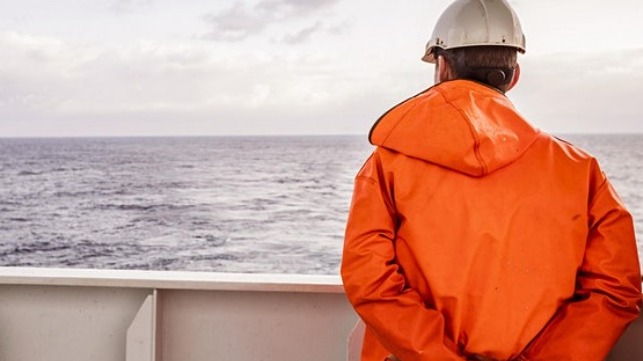Time to Act on Mental Health at Sea

We need to understand the scale of the problem of mental health at sea, offer solutions and support – and take action to help struggling seafarers.
The pandemic shone a light on the essential workers keeping our world turning. Yet there were some essential workers who were very much out of sight, out of mind.
At any time, there are more than 1.4 million seafarers on the world’s waterways, delivering fuels, foods and medical supplies across the globe. Yet when the pandemic struck and countries closed borders and flights were cancelled, up to 400,000 were trapped at sea, according to figures from the International Chamber of Shipping.
200,000 still affected by crew change crisis
Things have improved but around 200,000 seafarers are still affected by the crew change crisis as governments reintroduce border controls and travel restrictions to curb COVID-19 variants.
As maritime unions push for seafarers to be recognized as key workers to allow them free movement and ensure they are prioritized for vaccination, there’s real concern about the mental health impacts of the past year on seafarers stranded far from home, sometimes for more than 12 months, and often without pay or future job security.
Unsurprisingly, there have been reports of increased mental stress, hunger strikes, conflict and suicide.
“Shore leave is a big source of being able to replenish energy,” said clinical psychologist Charles Watkins, the managing director of Mental Health Support Services (MHSS), which provides one-to-one therapy, training and a confidential 24/7 hotline run by clinical psychologists to 5,000 ships.
“We’re seeing a lot of depression, burnout, anxiety and panic attacks because it’s a very long time to be stuck at sea, particularly for younger cadets who aren’t used to extended contracts and haven’t had the life experience to develop … coping strategies.”
A unique work environment
IMarEST Mental Health and Wellbeing champion Captain Panos Stavrakakis agreed. “These issues were there but the pandemic really highlighted them and created a real drive to understand the problem, what’s causing it and what measures can be introduced,” he said.
“It’s clear the seafarer workplace is unique,” said Captain Stavrakakis. “Workers are isolated, they stay onboard for months, may suffer from disrupted sleep and lack of exercise. They work long hours in difficult and sometimes potentially unsafe conditions and face job insecurity. They’re living alongside crew who may have very different values, languages and cultures, so they don’t have their usual support network in place if they are struggling. In many ways, they experience a constant form of lockdown while at sea – and after last year we all understand how that can impact mental health and wellbeing.”
Providing assistance
Some companies were already working on mental health initiatives, putting them in a good position to respond when the pandemic hit.
Norman Schmiedl, Group Director of Crewing at Columbia Ship Management, said crews still tend to be male-dominated, which can contribute to a reluctance to open up about mental health.
“We do training, seminars, there are posters and videos, calls from directors to the ships to raise awareness and normalize talking about mental health,” he said. “It’s about saying “it’s OK to ask for help”, which is a big change in the seafarer mindset.”
He stressed that even with crew members trained to spot mental health warning signs, it’s important to have outside expertise on call. “Sometimes, understandably, people do not want to talk to their colleagues about these issues.”
Columbia has been working with MHSS, which promotes a holistic approach to mental health, educating seafarers on how to safeguard their mental health. It advises seafarers to stay in touch with friends and family, to stay connected with colleagues through onboard social events such as basketball, table tennis and BBQs, to eat well, take physical exercise and focus on good sleep hygiene.
“Buddying up younger cadets with older mentors can also help, giving them a chance to learn coping strategies and encourage them not to spend too much time on their own on social media,” said Charles Watkins of MHSS.
Mark O’Neil, CEO of Columbia Shipmanagement and president of ship management association InterManager, which represents more than 5,000 vessels and 250,000 seafarers, said employers need to make mental health a priority. “Those companies which recognize and nurture the importance of mental health and the mental fitness of their employees will undoubtedly fare better during the pandemic and emerge stronger after it,” said O’Neil. “Companies were not aware of the correlation between mental health and performance before the pandemic, so the learning curve could not have been steeper or faster.”
Capt. Panos Stavrakakis, however, said this isn’t just a matter for individual employers. “It’s an international problem and it’s going to need international collaboration, bringing together lots of different stakeholders including the IMO, the unions and employers, to really make a difference,” said Stavrakakis, who will be chairing IMarEST’s First Gobal Conference on Seafarer Mental Health & Wellbeing on May 25-26. “The conditions at work can hugely affect mental health and wellbeing and the industry needs to acknowledge this.”
Columbia is one company taking action. It has subsidized a new insurance product, ColumbiaCrewCare, which offers seafarers life insurance and an investment plan for medical costs, disability provision, pension planning, or house/car purchase for as little as $1.20 per day. Such initiatives provide evidence that, whether at sea or ashore, the employer really does care about the seafarer and their family, helping to provide some peace of mind.
Attendees can register for the event via the IMarEST’s website here.
The opinions expressed herein are the author's and not necessarily those of The Maritime Executive.

